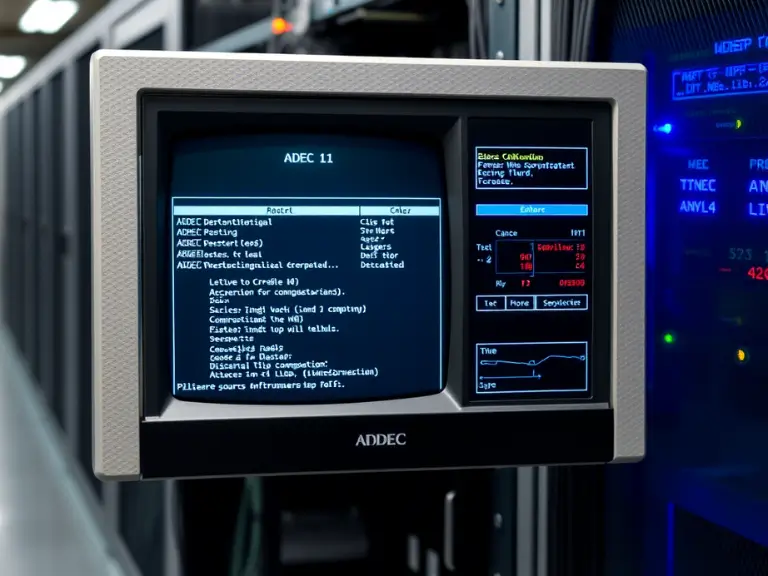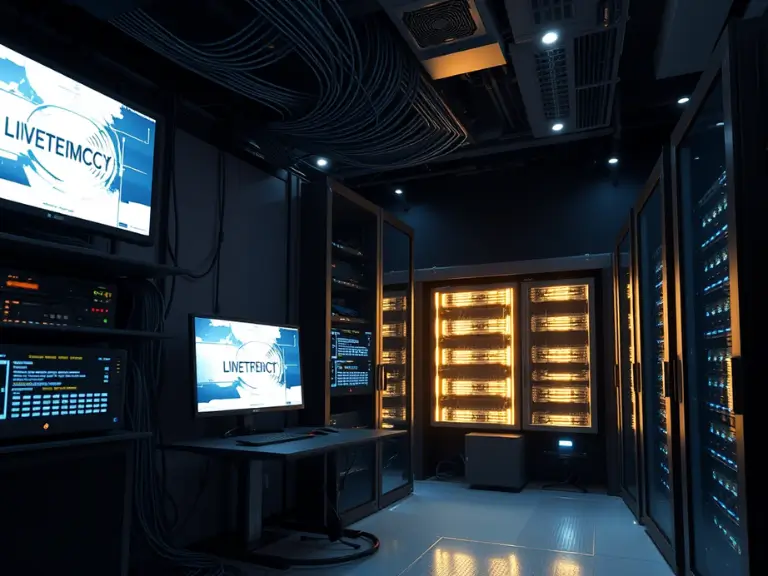Retrocomputing Done Right: 9 Web Hosting Providers for PDP-11 Emulator Enthusiasts
This platform is proudly ad-free! To keep it that way and support our efforts, some posts may contain affiliate links. These links come at no extra cost to you, but they help us grow and continue providing valuable content. Thank you for your understanding and support!
Finding the best hosting for DEC PDP-11 emulator websites requires understanding the unique needs of these vintage computing enthusiasts. The legacy of these iconic minicomputers lives on through dedicated communities seeking reliable platforms to share their passion. Specialized hosting solutions can make all the difference in delivering authentic experiences to fellow retrocomputing aficionados.
Modern web hosting providers often overlook the specific requirements necessary for running emulation environments effectively. Resources like CPU allocation, memory management, and storage configurations need particular attention when hosting these specialized sites. The right provider balances technical capabilities with affordability for hobbyist maintainers.
Security and stability become paramount concerns when preserving digital artifacts of computing history. Dedicated support teams familiar with legacy systems can provide invaluable assistance when technical issues arise. The ideal hosting solution creates a foundation for these historical computing treasures to be shared with current and future generations.
| Hosting Provider | Type | Best For | Price (Starting) | Pros | Cons |
|---|---|---|---|---|---|
| A2 Hosting | Shared Hosting | Beginners & devs wanting speed + easy setup | $2.99/mo | Turbo servers, cPanel, great support, dev-friendly tools | Renewal rates can be high |
| DigitalOcean | Cloud VPS | Developers who want full control | $4/mo | Full root access, SSD storage, scalable, CLI power | Requires server setup knowledge |
| DreamHost | Shared Hosting | Hobbyists needing static/simple dynamic sites | $2.95/mo | Free domain, unlimited traffic, beginner-friendly | No cPanel, less backend flexibility |
| GitHub Pages | Static Hosting | Developers hosting static projects for free | Free | Free hosting, HTTPS, Git-based deploy | No backend or server-side logic |
| Linode (Akamai) | Cloud VPS | Hardcore Unix/Linux users with emulator needs | $5/mo | Root access, Linux control, great documentation | CLI-only, manual updates and backups |
My Considerations for Hosting PDP-11 Emulator Sites
Choosing the right web host for your PDP-11 emulator site isn’t about power—it’s about precision. Most PDP-11 projects don’t require much in terms of resources, but there are key features and requirements that can make or break your setup. Here’s what you should look for:
1. Lightweight Resource Support
The good news? PDP-11 emulators and related content are typically lightweight. Whether you’re hosting an emulator like SIMH, distributing bootable disk images, or just running a vintage-style site, you don’t need tons of CPU or RAM. A basic shared hosting plan or a minimal VPS will usually do the job.
Pro tip: Avoid hosts that overcharge for power you won’t use.
2. Unix/Linux Compatibility
Most PDP-11 enthusiasts are already comfortable with Unix-based systems. Hosting environments that offer SSH access, command-line tools, and Linux OS options (like Debian or Ubuntu) give you more control—especially if you want to compile or tinker with emulator backends.
3. Static Site and Minimal Dynamic Support
Many PDP-11 emulator websites are either:
- Static HTML/CSS pages,
- Lightweight file servers,
- Or minimal backend interfaces (e.g. PHP or Python-based utilities).
So, hosting that supports static sites or low-overhead scripting languages is ideal. You don’t need a bloated CMS like WordPress unless you’re adding a blog.
4. Custom Domain and SSL Support
Even for a personal retro project, it’s worth having a custom domain and HTTPS. A host that offers free SSL (via Let’s Encrypt) and easy domain integration will save you time and money. Plus, Google prioritizes secure websites.
5. Developer-Friendly Environment
Look for features like:
- Git integration
- Cron jobs (for automation)
- FTP/SFTP access
- Easy file and permission management
These are especially useful when you’re updating emulators, serving binary files, or automating boot scripts for online demos.
6. Cost and Scalability
Most PDP-11 emulator websites are run by hobbyists—so cost matters. Look for providers that offer:
- Low-cost shared hosting,
- Pay-as-you-go VPS pricing,
- Or even free static site hosting (e.g., GitHub Pages or Netlify).
If your site gains traction, make sure it can scale without a painful migration process.
7. Reliable Uptime and Backups
You want your retro computing project to be available to users and fellow enthusiasts. Hosts that provide daily backups, high uptime (99.9%+), and strong customer support are a big plus.
Summary:
You’re not hosting a AAA game server or an e-commerce store. You’re hosting a piece of computing history. Find a host that gives you lightweight, secure, developer-friendly support at a price that fits a hobbyist’s budget.
5 Best Providers for PDP-11 Emulator Websites (+4 Bonus)
1. A2 Hosting
If you’re looking for speed, reliability, and a developer-centric environment, A2 Hosting is one of the best options for hosting PDP-11 emulator websites. Whether you’re serving static pages, downloadable disk images, or a minimalist terminal-style interface, A2 delivers the tools and performance you need—without the fluff.
Why It’s Great for PDP-11 Emulator Sites
- High-Speed Servers: A2’s Turbo Servers boast up to 20x faster load times. While your PDP-11 emulator pages won’t be heavy, the snappy performance enhances user experience—especially if you’re serving emulator demos or downloadable files.
- Developer Tools: A2 is known for its developer-friendly features:
- Full SSH access
- Git integration
- Support for Perl, Python, PHP, and even Node.js
- Easy file and permission management
- Linux-Based Hosting: Perfect for Unix-loving retro computing fans. You’ll feel right at home with the terminal-level control.
- Free SSL + Free Site Migration: Add a custom domain and get HTTPS without paying extra. If you’re moving from another host, they’ll migrate your site for free.
- One-Click App Installers: If you decide to add a blog, forum, or wiki to your emulator site, you can do it in seconds.
Pros
- Great uptime and speed
- Full control with SSH, cron jobs, and scripting support
- Affordable shared hosting plans
- Excellent customer support with live chat
- 30-day money-back guarantee
Cons
- Renewal prices can be higher than the initial promo rate
- Turbo plans (fastest servers) cost extra
Best For:
Retro computing hobbyists who want a reliable, flexible environment to host emulator files, basic web interfaces, and static pages. Ideal if you like having full control over your backend without needing a complex setup.
2. DigitalOcean
If you’re a hands-on enthusiast who loves working at the command line, DigitalOcean is your playground. With its flexible and affordable cloud infrastructure, it’s an excellent choice for running lightweight emulator projects like PDP-11 sites using tools like SIMH or serving static content via Nginx or Apache.
Why It’s Great for PDP-11 Emulator Sites
- Customizable VPS (Droplets): DigitalOcean lets you spin up a droplet (a cloud-based virtual server) tailored to your exact needs. Want a barebones Ubuntu setup? You got it. Need to install SIMH, serve files, or run a lightweight web UI? No problem.
- Linux Freedom: You get root access and full control over your environment. Perfect if you’re replicating a vintage Unix feel or scripting emulator behaviors.
- Static or Dynamic Support: Whether you’re building a simple front-end for your PDP-11 emulator, or adding backend tools to interact with it, DigitalOcean can handle both—without bloat.
- Developer Ecosystem: Their community documentation is top-tier, and their marketplace includes preconfigured stacks you can launch instantly (LAMP, LEMP, etc.).
- Scalability: You can start with a $4/month droplet and scale up if your project grows. Bandwidth and CPU usage are transparent and easy to monitor.
Pros
- Full root access with complete system control
- Lightweight VPS with SSD storage
- Transparent pricing with hourly or monthly billing
- Amazing community tutorials for DIY setup
- Reliable infrastructure (built on top-tier data centers)
Cons
- No traditional shared hosting—requires technical skills
- Manual setup (no one-click installs or cPanel)
- Not ideal for beginners unfamiliar with Linux or SSH
Best For:
Tech-savvy users who want full control over their environment. DigitalOcean is perfect for building a fully custom emulator site from the ground up, with command-line precision.
3. DreamHost
Not everyone needs a full-blown VPS to host their PDP-11 emulator project. If you’re looking for something beginner-friendly yet capable, DreamHost hits that sweet spot. It’s perfect for hosting static sites, file repositories, or lightweight PHP-based interfaces—making it ideal for retro computing fans who want a “set it and forget it” hosting solution.
Why It’s Great for PDP-11 Emulator Sites
- One-Click Static Hosting: Whether you’re uploading HTML/CSS or an old-school terminal-style design, DreamHost handles static sites with ease. Their custom panel is intuitive, and the file manager makes it simple to deploy.
- Unlimited Bandwidth and Traffic: If you’re sharing bootable disk images or emulator binaries, you won’t be penalized for traffic spikes. Great if your project starts getting attention.
- Free SSL & Domain Name: Every shared hosting plan includes Let’s Encrypt SSL and a free domain for the first year—handy for creating a professional presence for your PDP-11 site.
- Unix-Based Hosting Environment: DreamHost runs on Linux servers and supports SSH, SFTP, and popular scripting languages. While you don’t get root access, you do get enough freedom for most lightweight emulator sites.
- Automated Backups & 24/7 Support: Reliable support and automatic backups give you peace of mind, especially when preserving vintage software or configurations.
Pros
- Beginner-friendly hosting dashboard
- Free domain + SSL included
- Great for static and simple dynamic pages
- Unlimited traffic on all plans
- Strong reputation for uptime and transparency
Cons
- No cPanel (uses a custom control panel instead)
- Limited backend control compared to VPS providers
- Advanced features require higher-tier plans
Best For:
Retro computing hobbyists who want an affordable, no-fuss platform for hosting emulator landing pages, download portals, or small archives. Ideal for users who prefer ease of use over deep customization.
4. GitHub Pages
If your PDP-11 emulator site is static (HTML, CSS, JavaScript), then GitHub Pages is a no-brainer—especially if you’re already storing your project files on GitHub. It’s completely free, fast, and surprisingly reliable for hobbyist projects.
Whether you’re building a simple retro-themed front-end, sharing emulator source code, or hosting documentation, GitHub Pages gives you a clean and professional way to publish your work.
Why It’s Great for PDP-11 Emulator Sites
- 100% Free Hosting: No catch. You get a public URL, fast global delivery via CDN, and zero hosting fees. Perfect for budget-conscious retro computing enthusiasts.
- Seamless Git Integration: Any changes you make to your GitHub repo can be auto-deployed to your site. You don’t even need a separate file manager—just push updates via Git.
- Supports Jekyll: Want to add a blog or some structure to your content? GitHub Pages supports Jekyll, a static site generator that plays nicely with Markdown and templates.
- Custom Domains + HTTPS: You can link a custom domain to your GitHub Pages site and add HTTPS via Let’s Encrypt—for free.
- Minimal Setup: Perfect for static emulator showcases, terminal-style themes, or pages that mimic 70s/80s UI styles.
Pros
- Totally free hosting
- Git-based version control and deployment
- Fast and reliable global CDN
- Great for documentation or static emulator demos
- Supports custom domains and SSL
Cons
- Only works for static sites (no backend or dynamic features)
- Requires basic GitHub/Git knowledge
- No server-side scripting (e.g., PHP, Python)
Best For:
Developers or hobbyists with static PDP-11 emulator content who want a fast, zero-cost solution. Ideal for project documentation, landing pages, or even hosting emulated interfaces with JavaScript front-ends.
5. Linode (Now Akamai)
If you’re building a fully hands-on PDP-11 emulator environment—maybe even mimicking a classic UNIX V6 or V7 experience—Linode (now part of Akamai Cloud) gives you the raw control you need. It’s a favorite among developers who want VPS-level freedom without cloud complexity.
From SIMH emulators to self-hosted retro terminal UIs, Linode offers a clean slate and reliable infrastructure.
Why It’s Great for PDP-11 Emulator Sites
- Full Root Access on VPS: You can install any OS, compile legacy tools, or run emulator environments just like a real mini-computer setup. Whether it’s Debian, CentOS, or Arch, it’s all up to you.
- Affordable Entry Point: Starting at just $5/month, you get a dedicated virtual machine with SSD storage, unmetered traffic, and lightning-fast setup.
- Strong Unix-Like Tools: Linode gives you direct access to Linux shells, cron jobs, firewall rules, and more. It feels like managing your own PDP-11—just with modern speed.
- Scalability: You can scale up resources as needed, especially if you’re serving emulator demos or binaries to a wider community.
- Stellar Documentation & Support: Linode has one of the best developer-focused documentation libraries around, especially for Linux-based projects.
Pros
- Root access and OS flexibility
- Stable, high-performance VPS platform
- Unmetered traffic across all plans
- Superb developer documentation
- Transparent pricing with flat monthly rates
Cons
- Not beginner-friendly — requires command-line knowledge
- No shared hosting plans or visual control panel
- You manage your own updates, security, and backups
Best For:
DIY tinkerers, Linux pros, and PDP-11 emulator developers who want total system control. Perfect if you’re emulating entire operating systems or creating educational retro environments for others to explore.
Bonus Options – Alternative Hosting for PDP-11 Emulator Projects
Sometimes your PDP-11 emulator site doesn’t need full-blown infrastructure or you want something off the beaten path. These bonus options offer unique value depending on your skill level, project type, or budget.
1. Netlify – Free Static Hosting with Continuous Deployment
If you’re building a static HTML/CSS front end for your emulator project or hosting retro documentation, Netlify is a brilliant, developer-friendly alternative.
- 100% free tier for most hobbyist use cases
- Super fast with built-in global CDN
- Git-based deployment like GitHub Pages
- Supports custom domains & HTTPS
- No backend/server-side scripting allowed
Best For: Modern static sites, emulator demos, or minimal terminal-style interfaces with Git integration.
2. Vercel – Sleek and Fast for Modern Static Frontends
Vercel is very similar to Netlify but focused more on modern JavaScript and frontend frameworks. If you’re integrating your emulator with a UI built in React, Svelte, or even plain HTML/JS, Vercel can host it with ease.
- Free for personal projects
- Auto-deploy from Git
- Great performance for static and serverless functions
- Can handle small APIs if needed (e.g., dynamic config panels)
Best For: Emulator projects with modern web UIs or interactive dashboards.
3. Neocities – For That True 90s Web Vibe
Want your emulator site to look and feel like it’s running on a 90s internet connection? Neocities is a throwback static hosting platform that encourages hand-coded HTML and old-school vibes.
- Free static hosting with 1 GB space
- Supports custom domains
- No backend/server-side code
- Community-focused with a retro feel
Best For: Nostalgia-driven emulator pages that pay homage to early web culture and BBS-style designs.
4. AWS Free Tier – Enterprise-Level Playground
If you want to experiment with more complex emulator deployments, you can use the Amazon AWS Free Tier to set up a free EC2 instance (for 12 months). Perfect for advanced users comfortable with cloud networking and Linux.
- Free virtual server for one year (750 hours/month)
- Full root access and scalability
- Can install emulator software and host download sites
Best For: Advanced users building robust or educational PDP-11 environments.
Frequently Asked Questions (FAQs)
1. What is a PDP-11 emulator?
A PDP-11 emulator is software that mimics the behavior of the classic PDP-11 minicomputer, a historic machine from the 1970s and 1980s. Emulators allow modern users to run old software designed for the PDP-11 on current hardware, making it a popular choice for retro computing enthusiasts.
2. Can I host a PDP-11 emulator website for free?
Yes! There are free hosting options available, especially for static websites. Platforms like GitHub Pages, Neocities, and Netlify offer free hosting that works perfectly for simple PDP-11 emulator websites that don’t require server-side processing.
3. Which hosting type is best for PDP-11 emulator websites?
The best hosting for your PDP-11 emulator website depends on your needs:
- If you want full control over the environment and possibly emulate older systems or run a server, a VPS (Virtual Private Server) like DigitalOcean or Linode is ideal.
- For simple static websites or documentation, shared hosting from providers like A2 Hosting or DreamHost will suffice.
- If you’re a developer looking for a quick, free solution, GitHub Pages or Netlify might be your best bet.
4. Do I need a custom domain for my PDP-11 emulator website?
A custom domain is not necessary but can make your website look more professional. Most hosting providers, including DreamHost, A2 Hosting, and GitHub Pages, support custom domain setup, allowing you to register a domain (sometimes free for the first year) and connect it to your site.
5. Can I run a PDP-11 emulator on a shared hosting provider?
You can run static sites or basic PDP-11 emulator demos on a shared hosting plan. However, for more complex projects that require running emulator software or interacting with old OS images, a VPS (like DigitalOcean or Linode) will provide the necessary power and flexibility.
6. Is it easy to manage my PDP-11 emulator website?
It depends on the hosting provider and the type of website you are running. For example:
- Shared hosting services like DreamHost or A2 Hosting typically offer easy-to-use control panels (cPanel) to manage your files, databases, and website settings.
- VPS platforms like DigitalOcean or Linode require you to manage everything through the command line (CLI), which may require more technical knowledge.
7. How much bandwidth do I need for hosting a PDP-11 emulator?
For static websites (like PDP-11 emulator landing pages or download portals), most hosts offer unlimited bandwidth, so traffic won’t be a concern. However, if your emulator site is expected to serve large files (e.g., disk images, emulation software), you’ll want to make sure the host allows enough data transfer, and scalable VPS solutions like DigitalOcean or Linode are better suited for this.
8. Is technical support available for PDP-11 emulator websites?
Yes! Hosting providers like A2 Hosting and DreamHost offer 24/7 support through live chat, email, and phone, which is very helpful for beginners. For VPS services like Linode or DigitalOcean, you’ll have access to excellent documentation and community forums, but technical support might be more limited unless you’re on a higher-tier plan.
9. Can I host an emulator for operating systems like UNIX or RT-11?
Yes, you can! Hosting a UNIX-like environment or even specific PDP-11 operating systems (like RT-11) can be done on a VPS platform like DigitalOcean, Linode, or AWS. These VPS providers give you full root access, enabling you to install and configure the environment you need.
10. How do I ensure my PDP-11 emulator website is secure?
To keep your site secure:
- Always use HTTPS (most hosting providers, like A2 Hosting and DreamHost, include free SSL certificates).
- Regularly back up your data, especially if you’re hosting emulator software and vintage files.
- If you’re using a VPS, keep your server and software up to date with the latest security patches.







